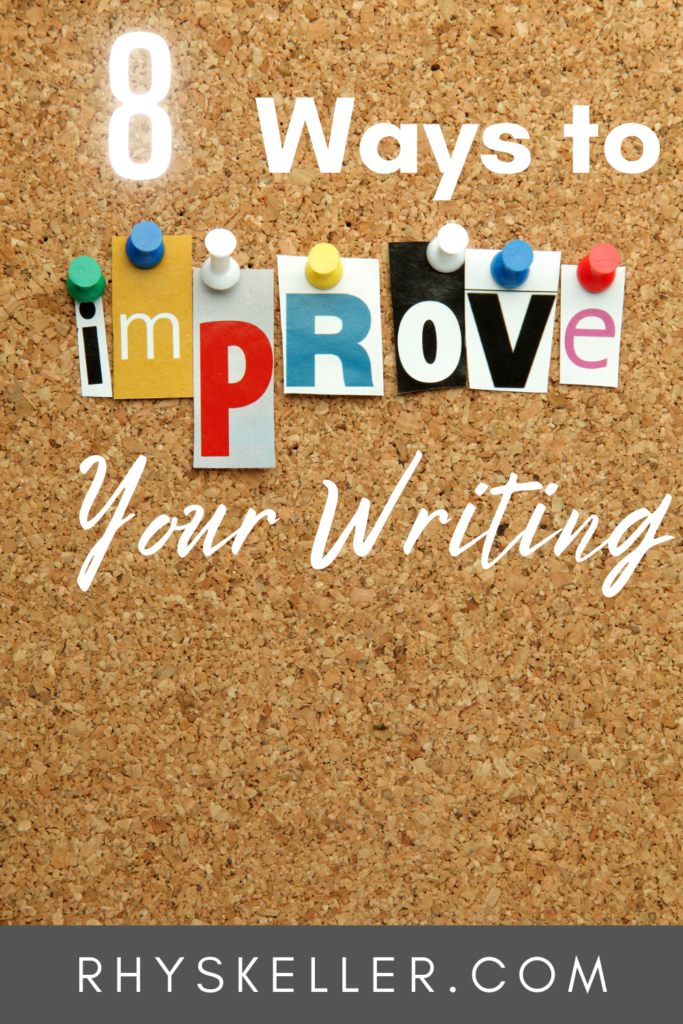Let’s face it. We don’t always have the best attitude towards our work. If we want to write something worth reading, we must take a hard look at our work and ourselves. Here are 8 ways your writing could be a lot better and exactly what to do about it. Skyrocket your writing results by working through these 8 target areas. If you do, you’ll see more and better feedback, responses, and reviews.
When you buy through my links, I may earn money from my affiliate partners. Learn more.
1. Refusing to Edit
I can’t tell you how many times I write a piece and on the first draft feel great about it.
Then, the sneaky suspicion of needing to edit slithers up from the abyss.
It’s at that moment my mind melts into sludge.
Why?
Because editing is hard work!
Editing requires humility. Even starting to edit requires accepting the fact that improvement is possible. Probable. And, given enough effort, powerful!
Many people don’t edit. They don’t self-review. They can’t bring themselves to take another look at what they’ve written.
The cold, hard truth is we all need to edit our work. Their is no glory in trying to create a piece so good no editing is necessary.
Spending time considering our work is time well spent.
It’s at this point, while accepting that editing is helpful and beneficial, our feelings raise up and jump to the opposite end of the extreme spectrum.
What if I edit too much? What if I never think my work is good enough? What if I edit out the best parts?
That’s not going to happen.
Rather than paralyze ourselves into inaction because we think “Oh no, I’m never going to publish or share this writing because I can’t stop editing it,” we know editing requires hard work and that effort will end.
We will eventually say enough is enough. The editing will stop. We’ll look back and be amazed how much better our piece has become.
No more one and done writing.
Edit your work before anyone else does.
2. Ignoring the Obvious
It’s really easy to ignore the obvious.
Really, really easy.
It could be a character that’s not working in the story or a plot twist that’s only funny or cool in our head.
But the moment we’ve moved the thought from abstract idea to tangible word reality, something just doesn’t feel right.
It doesn’t seem to make sense.
It doesn’t seem to fit.
And us authors are the WORST at holding onto an idea we know doesn’t work.
Maybe because writers treat ideas like babies. Maybe because we know how much effort has been required to create something new.
The longer we hold onto obvious problems with our work, the harder it is to arrive at completion.
We won’t feel done. We won’t feel ready. And although we don’t want to admit it, the reason is often because we are resisting the obvious.
We need to let those darlings die.
Which is another way of saying, let go of the obvious problems with your work. Take them, put them in a binder or a digital archive, and move on.
Don’t shed any tears. Don’t think twice. Just make the tough cut and move on with your writing.
3. Letting Little Things Slide
It’s not the elephant in the room that bites. It’s the mosquito.
That’s a cliche way of saying it’s the little things in life that hurt us the most. The big, obvious things are usually not the issue because we see them clearly and know they’re there.
Big things could be a gap in your story plot or a lackluster character. They could be a bad ending or a saggy middle (where the plot gets boring halfway through). Those big things can be found out easily and dealt with. They are clear to you as the author and you don’t mind tackling them.
The little things though, now that’s where it gets tricky.
Little things can be nuances. They can be gut feelings. They can be a single word or description that just isn’t doing it the way your story needs it to.
I love querying new manuscripts. Just like you, I’m sure.
There’s so much hope and excitement with a new manuscript. It hasn’t been beat down with rejections or tough editorial critiques.
One of the most enjoyable aspects of querying a new piece is discovering the little things that are holding a piece back.
I remember one story in particular that I was just over the moon about. Well, OK, yes, I’m over the moon about all my news stories, but that’s besides the point.
I thought this manuscript was to die for! It was so fun and witty and creative and unique…to me, anyways. Well, one of the first pieces of feedback I received was it didn’t have any inciting incident. Nothing really happened that kicked the whole thing off.
I didn’t think about that of course. To me, I just loved the story. I loved the idea that was created from nothing to something. I loved the characters and pictures in my own head about how the story would play out.
But I never realized there was nothing starting the story. It just…was.
Another story I remember querying received a little gem of feedback that the scenes I created in this children’s book manuscript weren’t very kid-friendly. Now it wasn’t violent by any means, but it wasn’t tailored. This feedback came from a veteran children’s book editor. It was as simple as swapping jet noise for parade noise. The scene just needed noise, it didn’t need jet noise. The small nuance change from jet to parade created more illustration potential and more opportunity to engage younger minds.
With a parade you can do music and instruments and marching and crowds…compare that to a roaring jet.
The little details can make or break a story. And if you end the story too soon, you may never find out what bites.
4. Ending Early
Ever sit down to eat a dessert that looks incredible but doesn’t taste as good as you hope?
This is the feeling we get when someone wraps up a job before the work is truly done.
When you’re writing a piece, it has to satisfy the reader. That satisfaction could be the reaching of a conclusion, the tying up of loose ends, or a surprise twist.
When someone reads your work, they are giving you their most valuable asset. Time.
As a writer, we must make it our purpose to write for the reader despite the constant lure of needing to finish.
Finishing is important. It’s critical and necessary. But finishing too early can be worse than not finishing at all because it can erase all we’ve done.
Spending years on a piece only to finish it too quickly for the sake of being done is literally like throwing it all away.
Put your best foot forward and take the time necessary to end at the right time so that your book, blog post, letter, or email is smooth and satisfying.
5. Putting Yourself Above Others
Is it OK if I say what we all think from time to time?
You won’t come at me with a pitchfork will you?
OK…
Here goes…
We can think we are better than everyone else. It’s not the most pervasive thought, but deep down inside we often regard ourselves and our writing a step above other people’s.
This mindset can manifest itself in seeing a book in the library and thinking “Wow, how did this ever get published while my work is still in the query trenches?”
Or, we can subtly put ourselves above other people by giving up on our writing because we’re not seeing results. While sometimes we give up because of the other 7 items on this list, every now and then we give up because “They just don’t appreciate good writing.”
And we chalk up our rejection or lack of traction to being “ahead of our time” or “writing great content that isn’t all about a marketing gimmick”.
The sad reality here is we are not above anyone else. We are us. We are unique. Our writing is special and appeals to a select group of people. If we settle on our own skills and abilities, we’ll never grow. Our writing will never appeal to a larger audience.
Appealing to audience is critical to an author’s success.
No writer wakes up and thinks, “I hope I appeal to the least number of people possible.”
We all want to grow. We want our sphere of influence to become bigger and bigger.
We want our influence to span cities, regions, and industries. We pour our hearts out on the page to impact people. We want our words moving among the masses. We want to grip hearts in palaces and poverty.
Our ideas will never make it past our own doorsteps until we humble ourselves, appreciate others’ feedback (and yes, silence and rejection is feedback!), and take action to grow ourselves.
6. Rushing It
Writers are SO BAD at rushing their work.
The moment we start down the path of writing down our ideas, there is a seed inside us that begins to grow.
That seed is the desire for our work to be received well by others. To be sought after. To be wanted.
As we write, that seed of longing begins taking up more and more space inside our heart and mind.
At some point, when the muse goes away and finishing our writing project begins losing traction, the size of the longing tree inside us becomes sick.
Our mind is torn between knowing the work needs to be finished properly and just wanting to satisfy the longing tree.
If we’re not careful, the longing tree can begin tainting our view of our work. We’ll think our writing is so good everyone will love it. We’ll think we don’t need it to be edited. We’ll think whatever we’ve created is good enough.
Our unfinished work is good enough to be queried. Good enough for the acquisitions editor to see. Good enough to upload as an e-book for sale. Good enough to be stopped. Good enough to be put down so we can focus on that other idea…
Great writing cannot be rushed. This is why deadlines are so destructive to creative pursuits. If we’re not honest with the quality of our work, we can rush out something that isn’t even sellable.
All the time spent on crafting the story could be in vain if we rush it in the end.
A truly successful book is a work of art. It leaves a satisfying taste in the readers soul. We must elevate the priority of the reader and focus on giving our work the time it needs to shine.
7. Afraid of Negative Feedback
No one likes negativity.
Even negative people don’t like their own perspectives, which I suppose makes a lot of sense!
Here’s the real deal though. Each of us can handle negative feedback.
We can. It’s true. Thinking we can’t or getting into a tizzy when it comes is an excuse we give ourselves. It’s the easy way out.
But as you know, it’s hard work that pays off. Not easy ways out!
Feedback is feedback.
In business, entrapreneurs test their ideas frequently. The term Minimum Viable Product (MVP) describes business owners bringing to market the bare minimum of their idea in order to test the product or service in the real world.
Guess what happens? They get feedback. The widget sells or it doesn’t. The gizmo gets traction or it doesn’t.
That feedback is crucial to the entrapreneur the same way feedback is crucial to the author.
Feedback gives us directions. We learn what is working and what isn’t.
With enough feedback, we can kill the right darlings. We can focus on the plot holes. We can further develop the boring characters. We can add the necessary arguments.
As a writer, we are proverbially blind from seeing the forest through our own trees.
We have blind spots. All of us. One of our biggest blind spots is our baseline assumptions.
See (pun indended!), our assumptions are usually ideas that haven’t been written out. We might see a major character in all their flaws and finishes in our mind, but what we’ve written might leave too much to the imagination.
Or, we assume readers will know what we meant even though we didn’t describe everything we envisioned.
These are blind spots only discovered through feedback.
Here’s an easy way to remember it.
Feedback is exactly that…Feed + back. Our work needs food to survive. When we share our work, people feed our work with their thoughts and ideas. Our work can’t survive within us alone. It needs food from others. It needs…feedback.
Now, there’s good feedback (that nourishes our work) and bad feedback (that disheartens us).
It’s up to us to decipher what type of feedback we received and what we can do with it because it’s ALL feedback.
8. Unwillingness to Promote Yourself
People can be so humble in all the worst ways.
What do I mean by that?
I often hear people say they don’t like to promote themselves.
They think it’s pompous or arrogant to say anything good about themselves.
While I often sucumb to this thinking myself (which is what qualifies me writing about it!), it’s just not beneficial.
If we ever hope to impact people with our work, we must first be willing to stand on a mountain (alone) and proclaim it’s worth their time.
Time is the most valuable asset all of us have.
If you want a critique provided, a query read, a submission reviewed, a book taken off the shelf, or a book review left…you must decide it’s worth the most valuable commodity someone has at their disposal.
If you get this and I mean REALLY get this, the response rate you’ll get on your work will skyrocket.
The reason you’ve spent time writing and creative is because in your heart of hearts you BELIEVE it is worth someone else’s time. You BELIEVE it will impact someone in such a way as to leave them better off than before. You BELIEVE the ideas presented are valuable and should be taken to heart. You BELIEVE you’ve toiled and struggled in the creation of your work for a purpose and that bringing it to fruition is a necessity.
If you BELIEVE all that, you already BELIEVE it’s worth people’s time. And if it’s worth people’s time, it’s worth you telling them so.
The way you tell people this is by promoting yourself.
Promotion has developed such a negative connotation because of bad promotion. Think sketchy car salesman or late night infomercial.
But just because bad actors have taken promotion to the dark side, you can still use it like a Jedi!
Tell people what you’ve created. Tell people what you love about it. Tell people how it could help them. Tell, tell, tell.
Do you know what promote really means?
To promote is to advance something or someone to a higher office. It means to move it or them forward or cast light on something or someone.
You’ve been writing in the darkness. On your own. Alone. Once you’ve created a first draft, it’s time to advance it and move it forward to critique and feedback. Once you’ve polished the draft and believe it’s as good as it can be, it’s time to advance it forward once again. You must shine a light on it and move it another step in the journey, whether that’s querying a literary agent, submitting it to a publisher, posting it as a blog, or sending it straight to a self-publishing platform.
All of that is promotion. The time you spend is valuable. The work you create is valuable. So do what’s right and advance it through a journey of telling people about it.
Promote, promote, promote! Eventually, other people may just start promoting it for you!
If you enjoyed these 8 ways your writing could be a lot better, I’d love to hear from you in the comments below.
- What resonated with you?
- What challenged you?
- What would you add to this list?
I’d also appreciate if you shared this post on social media using the share buttons provided. If you’re not signed up for my newsletter yet, please do! I’d like you to be the first to know about new posts that will impact you. Take a moment and find the email signup in the sidebar (or below if you’re on a mobile device).






